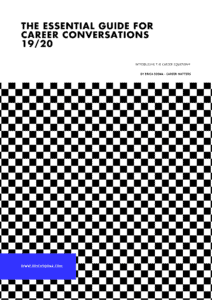Is your career on track? Here’s a tool to help you find the right career path.
We spend an incredible 80,000 hours at work during our lifetimes. That’s more time than we spend with our loved ones! And most of us put more thought into choosing our holiday destinations than we dedicate towards planning our career paths.
Can we be blamed? As a career coach, my experience of the challenges we face in defining, driving and owning our careers shows the odds are stacked against us. But there is a way to deal with these issues – a simple model we can use to help define our career paths and establish a solid starting point for effective career conversations with coaches and managers.
First, let’s agree on the obstacles.
 Poor career advice
Poor career advice
Poor careers advice early on in life meant we didn’t get to align a deep level of self-knowledge with the opportunities in the world of work. Thus most of us fell into our careers rather than chose them. This leaves us feeling potentially confused and doubtful about whether we made the right choices.
Comments like Karvita Parkyn’s, now a Learning & Development manager, are all too common;
“I was a frustrated mum who knew her potential just wasn’t being realised. You made me see that I should not give up on chasing my dream role.”
Changing aspirations over time
What we find fulfilling changes as we change. Maybe a role with lots of travel was fantastic when you were twenty but is exhausting as you approach mid-life. What we find fulfilling evolves as we do. As life circumstances and priorities shift, we need a way to re-evaluate where work sits within our wider life context.
Lizzie Clark, a Print Fashion Designer told us a familiar tale;
“I was unsure what to focus on and what to take forward. I wanted someone to give me answers.”
What is success?
In this new world, the question of how you even define success becomes more and more important. We have been traditionally taught that success is about more money, seniority or status. It’s about ambition and climbing the greasy pole. But what if success is unique for each of us? And defined more by the experiences we want to have and the kind of life we want to lead?
How can we hear ourselves think about what truly matters to us and connect to it in a world that has got increasingly ‘loud’, bombarding us with media and messaging about how our work and lives are ‘supposed’ to be?
What is a career anyway?
At Career Matters, we define a career as a series of choices that explore how you align your gifts with how you spend your time and earn your money.
To navigate these choices effectively and thus feel empowered and in charge of your own career path, you need 3 things:
To be able to define what success means to you
Selection criteria for roles and opportunities based on that definition
To know what value you add and where you do your best work
The Career Equation
 The Career Equation® is a simple word equation which helps define the four components of a fulfilling career. I am sharing the model with you so you can build your own equation and use it to define the work that best suits you.
The Career Equation® is a simple word equation which helps define the four components of a fulfilling career. I am sharing the model with you so you can build your own equation and use it to define the work that best suits you.
Here’s how it works:
Skills
We say people are happiest when they work in an area of skill or strength. Sometimes we need a step back to fully appreciate what our particular skills are, as Erin Lawrence from Dorset Council found;
“I’ve been able to understand fully who I am (my skills and what drives me) and what I want from my career.”
When you do something you are good at and aim to become exceptional at it, you will experience a good deal of satisfaction.
Passions
We want to apply these key skills to an area of interest or ‘passion’.
Passion relates to subjects that arouse your curiosity or enjoyment. It also applies to behaviours or activities that cause you to feel so absorbed you lose track of time – for instance solving problems or making art.
When you apply your skills to an area of interest or to a passion, your satisfaction and your results grow. This is amplified even further when the goal or objective of our work lines up with our values. This is what we call impact.
Impact
We all define and measure our success in different ways. So it makes sense for you to understand how you define success and get clear on how you will track it. Is it the flexibility to work on your own terms? Being a leader in your field? Or the chance to deliver real results to customers?
These top three elements of The Career Equation® help you identify who you are and what matters to you. This clarity can be enhanced or compromised by the fourth element – the ground beneath your feet – we call this your level of “environmental fit.”
Environmental Fit
When a working style, culture, office environment or pace of work suits your personality, you thrive. When the two are not in alignment, you can struggle. It is important that you have the self-knowledge to know in what context you do your best work. Some elements of the environment can be open to change. Others are pretty fixed across the entire business. For example, you might be able to gain more autonomy by asking for it or moving to a different area but you may not be able to change the IT infrastructure!
Lois Downton, also from Dorset Council, found the true value of identifying her best environmental fit;
“I’ve been able to identify what attributes of mine are amplified when I am at my best and thriving. I can honestly say it has been a truly worthwhile experience for me.”
The Career Equation® can help you identify what’s working and what needs adjustment. It can also help you articulate the kinds of work you are looking for. And best of all, it will give you clarity about what you really want out of work, so you can go and get it!
How to Use the Career Equation to Manage and Review Your Career Path
The Career Equation® works because it separates the four elements that shape your ideal career path.
Begin by making four lists under the four elements of Skills, Passion, Impact and Environment. Where is there common ground? What do you currently use or under-use?
Next, consider your current work. If you were going to change anything in your work to better fit with your list of requirements, what would you change and why?
Last, think about your top 3 criteria in each category. If you were to brainstorm new roles or new work that suited these criteria, what would your career path and life look like?
Develop a career that works for YOU
Thinking about the distinct elements of The Career Equation® gives you a new way of examining your career path and the way in which you want to develop it.
The Career Equation® is an especially useful tool for effective career conversations.
Lizzie was able to use The Career Equation® sooner than she’d expected when she had an interview;
“I got a job offer. At the interview I was focused on who I was; I had a strong sense of this job needs to work for me – something I’ve never done before”.
And Paul Collier, working at the Open University, explained the long-term benefit he’s gained from working through The Career Equation®;
“It gave me a lot of focus and helped set out a clear direction of what I wanted to do.”
Just like Paul, you can use this information as a signpost or map, coming back to it periodically to check your career is moving in the direction you want it to move in. Your career is a series of choices; you alone have the power to change it for the better.
 The Career Equation® is one year old! In 2019 alone it helped 1,200 people understand their personal definition of success, helping them find a fulfilling career path.
The Career Equation® is one year old! In 2019 alone it helped 1,200 people understand their personal definition of success, helping them find a fulfilling career path.
Learn how to use The Career Equation® for more engaging and usable career conversations in your company with our FREE guide.
It’s full of new ideas, interesting facts and guidance. It also has a template email to help you get started with your career conversations and an editable planner so you can plan and implement your own career conversations in 2020.
By Erica Sosna
Creator of The Career Equation® and CEO of Career Matters
20 years of expertise in leadership, employee engagement and career management
Author of Your Life Plan (Wiley) and the forthcoming Career Equation (2021)
Clients include: Capital One, Mastercard, Savills and Dassault Systemes

